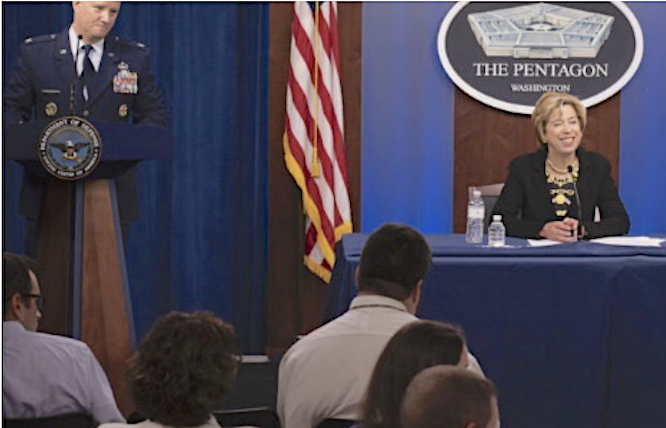A news conference at the Pentagon on Monday has indicated that there may be no further attempts at revising the currently heated National Security Space Launch Phase 2 Launch Service Procurement (NSSL Phase 2 LSP) competition. The decision follows after commercial companies sued the said competition in court for its unfairness.

“There are no changes imminent,” Ellen Lord, undersecretary of defense for acquisition and sustainment said.
However, confirmation towards possible revisions in future NSSL Phase 2 SPL competition remained uncertain.
“We will see how things go and adjust if necessary,” Lord said.
The NSSL is a program of the United States Air Force (USAF) intended to assure access to space for the Department of Defense (DoD) and other U.S. government payloads. Started in 1994 as the Evolved Expendable Launch Vehicle (EELV) launch system program, the initial program goal was to make government space launches more affordable and reliable.
The NSSL program helps the USAF to launch military satellites or provide commercial space companies contracts to launch lower value payloads, such as those of the Space Test Programs.
In this instance, the NSSL Phase 2 SPL competition was meant to determine two out of the four vying major commercial space companies to provide the USAF their services including launch service procurements within a 5-year deal starting in the fiscal year 2020 the through 2024 for missions that will be launch through 2027. Approximately, the USAF missions will be up to 25 missions.
Overseen by the Air Force and the National Reconnaissance Office, the NSSL program will only consider two reusable and expendable launch vehicles.
One of the winners of the competition will get 60 percent, the other 40 percent of the estimated $2.3 billion contracts. The Air Force and the NRO are projected to spend about a billion dollars a year on national security launch services.
Four companies submitted proposals for the Phase 2 procurement namely: United Launch Alliance, SpaceX, Northrop Grumman, and Blue Origin. Though no contracts have yet been awarded, companies competing in the NSSL Phase 2 competition already have taken the Air Force to court.
Individually, both SpaceX and Blue Origin have pursued legal action against the Air Force, arguing that it has failed to create a level playing field for them and other companies to be able to challenge heavily favored ULA.
So far, the U.S. Air Force has awarded only three of America’s four main “rocket companies” money to help pay for the development of their rockets that would perform the next batch of contracts, except for Elon Musk’s SpaceX.
Notably, SpaceX’s Falcon 9 and Falcon Heavy launch vehicles were competitively awarded nine missions over the last two years, which prompts the USAF to expect that the space company will continue to compete in Phase 2.
In light of the situation, SpaceX pointed out that its Falcon 9 and Falcon Heavy launch systems are “existing, certified and proven,” and said it “means to serve as the Air Force’s long-term provider for space launch.”
On the other hand, Northrop would continue developing its OmegA heavy-lift vehicle, ULA would continue work on its Vulcan Centaur, and Blue Origin would make progress on its New Glenn large rocket with the funding.
In Phase 2 of the competition, all four will be competing for the billion-dollar a year contract.
However, Jeff Bezos’ Blue Origin issued a complaint with the Government Accountability Office, alleging that the Air Force’s “acquisition strategy for the NSSL program” is “flawed” and “includes evaluation criteria that are ambiguous and fail to comply with federal procurement statutes and regulations.”
According to Blue Origin, the Air Force’s insistence on choosing only two winners will leave the other two bidders at a disadvantage as they will technically be left jobless within the five-year duration of the contracts.
Out of the increasing conflict, there are proposals coming from the House Armed Services Committee to change the rules set by the Air Force for the program and create more opportunities for new commercial launch companies to compete.
Pentagon, who also oversees the Air Force—who manages NSSL—said that they have listened to the concerns of the industry and has discussed them with the Air Force.
“I talk to the Air Force all the time,” Lord said. “Launch services is something that is of particular interest to us.” However, she indicated that the NSSL program would stay on its current course.
“I think we have been very transparent and very consistent with what the process has been for launch services, and we plan to continue with that.”
By Sean Louis Salazar, from Z6Mag.

